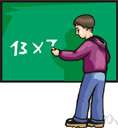The
school-age child is beginning to assume increasing responsibility for health maintenance and care, and, as maturity increases, is less dependent upon adult family members to recognize signs of altered health states or to communicate health care needs.
The purpose of this study was to further test the psychometric properties of a scale developed to measure children's perceptions of their after-school teacher and to understand the scale's relationship to the quality of the
school-age child care program.
Morgan Chase who have at least one
school-age child. The questions tried to gauge the extent to which parents' concerns about their children between the time school ends and the time they leave work affect their productivity and performance.
The
school-age child was becoming a discipline problem, so CC was called in to help.
The purpose of this study was to determine if participation in the North Carolina Quality Enhancement Initiative (NCQEI) improved the overall quality of the 26 participating
school-age child care programs in three North Carolina communities.
* Two-thirds of households with a
school-age child had a computer with 53 percent having Internet access.
Two-thirds of households with a
school-age child had a computer, and 53% had Internet access.
Section 2 reviews the physical, cognitive, and emotional development of the
school-age child and the adolescent.
The primary purpose of this study was to determine if participation in the North Carolina Quality Enhancement Initiative (NC QEI) improved the overall quality of the 26 participating
school-age child care programs in three North Carolina communities.
In response to this concern, numerous
school-age child care programs have been developed.
The demand for
school-age child care, which includes programs for children from kindergarten age through early adolescence during periods of time when schools are traditionally closed, has escalated due to changes in the structure of the family.
The featured articles for each month are: (1) "Transitions: Opportunities to Connect" (September); (2) "Art for All Kinds of Smarts" (October); (3) "Teasing and Bullying in After-School Programs" (November); (4)"Activities for
School-age Child Care--25 Years Later" (December); (5) "Cut Recess and Get Sued?" (January); (6) "Hiring and Training Summer Staff" (February); (7) "Beyond the 21st CCLC [Century Community Learning Centers] (March); (8) "Mathematica Report on 21st CCLC Leads to Threat of Funding Cuts" (April); (9) "Engaging Older Volunteers in After-School Programs"; (10) "JustPlay...or Is It?" (June); (11) "Lessons of Hope--The Boys and girls Club Mission" (July); and (12) "Reduce Conflict by Meeting Developmental Needs" (August).
 school-age child - a young person attending school (up through senior high school)
school-age child - a young person attending school (up through senior high school)